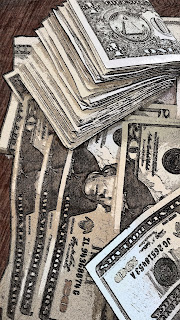To that I say, what?
If you don't know where your money is, you may as well kiss it goodbye. That sounds harsh. But it's also true. Because if there's one thing anyone wants, it's more money. And who better to take it from but the fools who will easily and willingly part with it.
Yep. That saying is true. A fool and his money will soon be parted.
Don't be the fool. Look, money can be scary and complicated. So can the stock market. But in all honesty, none of it is as hard as you think it is. More importantly it's not as hard as others have made you believe that it is.
Any why do they do it? Why do they make it sound so hard and complicated? If it were easier, who would need a so-called "expert" to guide the way for you? For a fee, of course. Lots and lots of fees. They are literally siphoning off your life's savings and you don't know it.
If you think about it, how many things do you do in your life to make sure things work and last? And what do you do to know it? You research it.
Here's how often you should change your oil in your car. Here's what to do to make sure your lawn mower starts on the first pull in the spring. You research and study what's the appropriate health insurance coverage that suits you. You evaluate your cable services to shop for the best deals and save money. How do I maintain my house and check the roof to make sure the shingles are doing their job? How do I ensure I have the best education to make sure I can make the income I want and need? What's the best college that teaches the courses essential for my career choice? What's best for my diet to remain healthy? What foods should I eat? What foods should I avoid?
We spend countless hours making sure we have what we need that makes our lives better, easier and cheaper.
Yet, when it comes to money, we turn a blind eye. "John's a great financial advisor and I know he has my best financial interests in mind."
Again. What?
Why would you spend all of this time to know things so you can get the most out of everything else but leave your financial health in the hands of someone else? Especially when it comes to your retirement years. A time when you can no longer necessarily earn an income and where everything you ever worked for in your entire life is literally on the line?
Expecting someone else to have your back is a fool's game. It's that simple. Again, harsh. But it's also the truth.
A weatherman can sell you an umbrella for top dollar because he knows exactly when the storm is coming. He will capitalize on your lack of understanding of certain indicators of weather. And it is no different in the financial world.
What you don't know, let me help you to understand. I'll just take 2% and you have to trust me. {wink, wink}
The thing is, there are as many resources as possible that abound about how to save, how to invest, how to plan for retirement, how to manage taxes during retirement, how to navigate Social Security and Medicare and how to budget as there are resources about everything else you want to make sure to get right in life.
Why is the financial stuff, perhaps the most important of them all, at a critical time in life when income is absent, the least important thing to research and know for most people?
I am sorry. But it makes no sense.
You want to feel bad for the people who get to the finish line broke and struggle. But how can you? It was all right there. The information. The signs. The stories told countless times before when Mommy and Daddy and Grandpa struggled through it.
Am I preaching? Yes. Am I scolding? YES!
It's funny to me that people will go through their entire lives saying, "Money isn't everything." Only to get to retirement and realize, it sure and hell means a lot more than they thought it did. But then, it's too late.
The pooch has already been screwed and John who managed your money doesn't give a damn about your struggle because he already took what he wanted from you, who you willingly gave it to with a smile and confidence.
You won't leave your lawn mower to John to make sure it starts in the spring when you need it for the first cut, but you will leave your entire financial future in his hands?
What???
All jokes and scolding and brash and harsh statements aside, the bottom line is that whether you think so or not, your money matters. It should be something important to you to know all you can about just like it's important to know all the other things in life you think are important.
Someone will always be willing to show you the way for a few bucks of your hard-earned money. Why not cut out the middle man? Not only will you save more money in the long run, you will most likely also amass much more of it. Because when you know what you're doing, and you're paying attention to it, you are much better equipped to make the necessary adjustments and assessments to ensure you get the biggest bang for your buck as you possibly can.
Like the way I write or the things I write about? Follow me on my Facebook page or on X to keep up with the latest writings wherever I may write them.




























